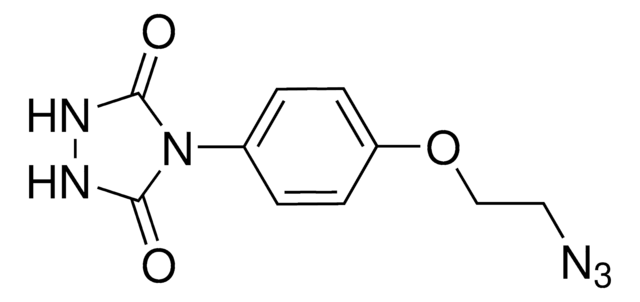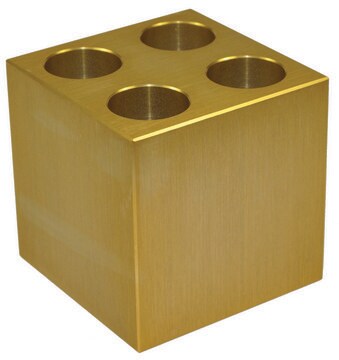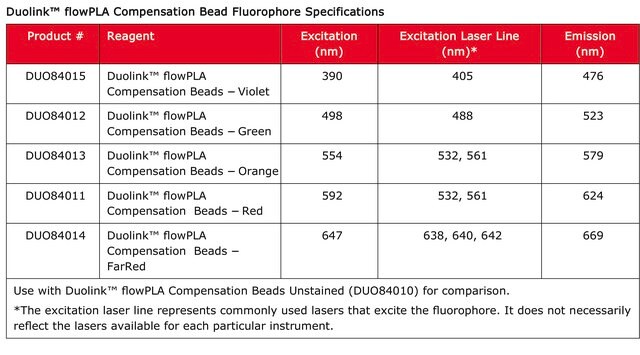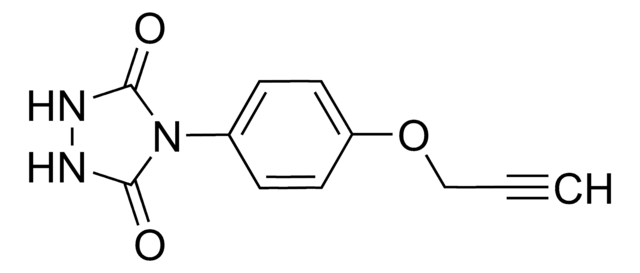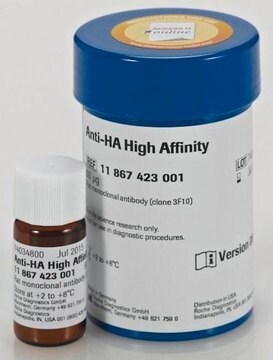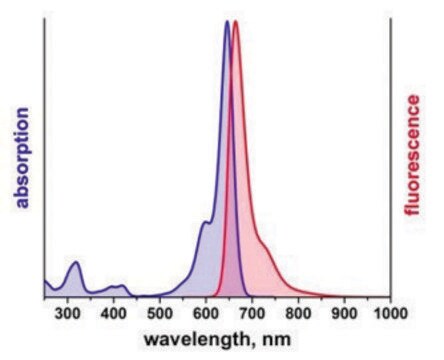推薦產品
品質等級
產品線
Duolink®
形狀
slurry
技術
flow cytometry: suitable
immunocytochemistry: suitable
immunofluorescence: suitable
multiplexing: suitable
proximity ligation assay: suitable
螢光
λex 592 nm; λem 624 nm (excitation laser line 532, 561 nm)
適合性
suitable for fluorescence
運輸包裝
wet ice
儲存溫度
2-8°C
應用
Duolink® proximity ligation assay(PLA®) allows for endogenous detection of protein interactions, post translational modifications, and protein expression levels at the single molecule level in fixed cells and tissue samples.
It is recommended that Duolink® compensation beads should be used when performing a multiplexed experiment (DUO96001) to save on time and reagent cost, rather than using precious sample. This product can be used to determine flow cytometry instrumentation collection parameters, inform experimental design, and as a control for compensation data for multiplexed FlowPLA experiments.
Visit our Duolink® PLA Resource Center for information on how to run a Duolink® experiment, applications, troubleshooting, and more.
To perform a complete Duolink® PLA in situ experiment you will need two primary antibodies (PLA, IHC, ICC or IF validated) that recognize two target epitopes. Other necessary reagents include a pair of PLA probes from different species (one PLUS and one MINUS), detection reagents, wash buffers, and mounting medium. Note that the primary antibodies must come from the same species as the Duolink® PLA probes. Analysis is carried out using standard flow cytometry equipment. Duolink® Multicolor flow PLA Reagent Pack Kits used with Duolink® flowPLA experiment, you will need fixed and permeabilized suspended cells, and at least two primary antibodies that specifically recognize your proteins of interest. Analysis is carried out using standard flow cytometry assay equipment. User must provide a fixed cell suspension and primary antibodies. Test your primary antibodies (IgG-class, mono- or polyclonal) in a standard immunofluorescence (IF), immunohistochemistry (IHC) or immunocytochemistry (ICC) assay to determine the optimal fixation, blocking, and titer conditions. Duolink® in situ reagents are suitable for use on fixed cells, cytospin cells, cells grown on slide, formalin-fixed, paraffin embedded (FFPE), or tissue (fresh or frozen). Flow validated antibodies are recommended.
It is recommended that Duolink® compensation beads should be used when performing a multiplexed experiment (DUO96001) to save on time and reagent cost, rather than using precious sample. This product can be used to determine flow cytometry instrumentation collection parameters, inform experimental design, and as a control for compensation data for multiplexed FlowPLA experiments.
Visit our Duolink® PLA Resource Center for information on how to run a Duolink® experiment, applications, troubleshooting, and more.
To perform a complete Duolink® PLA in situ experiment you will need two primary antibodies (PLA, IHC, ICC or IF validated) that recognize two target epitopes. Other necessary reagents include a pair of PLA probes from different species (one PLUS and one MINUS), detection reagents, wash buffers, and mounting medium. Note that the primary antibodies must come from the same species as the Duolink® PLA probes. Analysis is carried out using standard flow cytometry equipment. Duolink® Multicolor flow PLA Reagent Pack Kits used with Duolink® flowPLA experiment, you will need fixed and permeabilized suspended cells, and at least two primary antibodies that specifically recognize your proteins of interest. Analysis is carried out using standard flow cytometry assay equipment. User must provide a fixed cell suspension and primary antibodies. Test your primary antibodies (IgG-class, mono- or polyclonal) in a standard immunofluorescence (IF), immunohistochemistry (IHC) or immunocytochemistry (ICC) assay to determine the optimal fixation, blocking, and titer conditions. Duolink® in situ reagents are suitable for use on fixed cells, cytospin cells, cells grown on slide, formalin-fixed, paraffin embedded (FFPE), or tissue (fresh or frozen). Flow validated antibodies are recommended.
Let us do the work for you, learn more about our Custom Service Program to accelerate your Duolink® projects
View full Duolink® product list
View full Duolink® product list
特點和優勢
- Save time and reagent cost by utilizing beads for compensation rather than precious sample and multiplex reagents
- No overexpression or genetic manipulation required
- High specificity (fewer false positives)
- Single molecule sensitivity due to rolling circle amplification
- Relative quantification possible
- No special equipment needed
- Quicker and simpler than FRET
- Increased accuracy compared to co-IP
- Publication-ready results
成分
This product is comprised of the following:
6.0 - 8.0μm polystyrene beads suitable for use in flow cytometry assays. The bead slurry should have a concentration of 1.5-3.0 million beads/mL. Red beads can be mixed with the negative control compensation (DUO84010), or collected alone.
6.0 - 8.0μm polystyrene beads suitable for use in flow cytometry assays. The bead slurry should have a concentration of 1.5-3.0 million beads/mL. Red beads can be mixed with the negative control compensation (DUO84010), or collected alone.
法律資訊
Duolink is a registered trademark of Merck KGaA, Darmstadt, Germany
PLA is a registered trademark of Merck KGaA, Darmstadt, Germany
儲存類別代碼
12 - Non Combustible Liquids
水污染物質分類(WGK)
WGK 1
我們的科學家團隊在所有研究領域都有豐富的經驗,包括生命科學、材料科學、化學合成、色譜、分析等.
聯絡技術服務